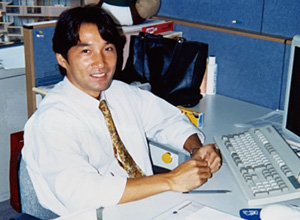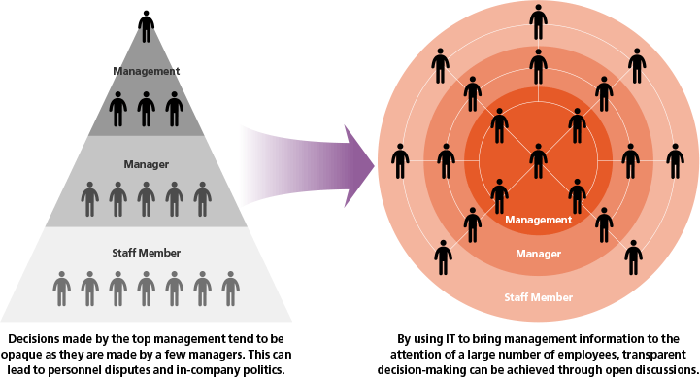Based on what I learned from foreign companies and global companies
I have begun to run to build a global software company originating in Japan
As a student, I was immersed in personal computer communications and excited of being connected to others.
I also witnessed the agony of my father, who was involved in the Company’s internal politics.
Through two original experiences, when I was senior at university, I became interested in topics such as “the impact of knowledge and information on human thought” and “the possibility of utilizing information in management decision-making.”
Then I started to seek a job and decided to jump into a foreign-affiliated consulting firm because I felt that the words of an employee of the company was close to me.

When I joined the company, I was surprised by a system that made use of human resources unique to foreign-affiliated companies.
The firm would send graduates from college without knowledge or know-how to overseas headquarters for six months and thoroughly teach them the manual so that they could, upon returning home, be able to make proposals that would solve problems of the customer and lead to high value contracts. It was surprising experience.
Of course, only a few of them would rise to an established consultant with manuals alone. However, at the very least, such methods of human resource development and monetization process undermined my existing concepts of “experience makes a person” and “custom-made is the only way to create added value” as Japanese people.
On the other hand, I was devastated by a pragmatic management style of foreign-affiliated companies.
The employment contract was a thorough performance-based system, and there was a year when performance deteriorated, and bonuses were not paid. I felt backlash with a unified evaluation system in which individual efforts and achievements behind the scene, working hard to identify the needs of customers and continuing overtime to complete proposals, could not be rewarded.
I was also impressed by overseas mission-critical business software packages.
When Microsoft was sweeping the PC market, there were software packages as a part of the IT system in Japan as well, but I was surprised by the idea of packaging the core systems of large companies.
However, I realized, it would be more beneficial for customers to use packages that incorporate knowledge and know-how on solving global companies’ issues, no matter how expensive, rather than creating systems from scratch for each company.
At the same time, I was amazed by the ideas of such overseas engineers and felt the sense of crisis that we Japanese engineers would be intellectually colonialized by overseas software companies and consulting companies.
This sense of crisis provided an opportunity to take on the challenge of developing world-class software in Japan.
Developing proprietary software — I set my goal to make corporate management decisions visible through the use of information technology. This eventually became our mission “Spreading Accountability.”
I grew up looking my father struggle. I believed that the decisions of many Japanese companies at the time were made behind the scene, determined by only a few among its management, and that it was one of the factors behind corporations’ internal personnel disputes and internal politics.
In order to change this situation, we need to make use of IT where the Internet environment has become the norm, to give many employees access to a variety of management information, and to make transparent decisions through open discussions.
We need to increase the number of companies that make, instead of top down, democratic decision based on shared information, companies that are exciting to manage and also companies that are rewarding for employees to work in which their own will is reflected in management. That was how I felt about starting a business.
